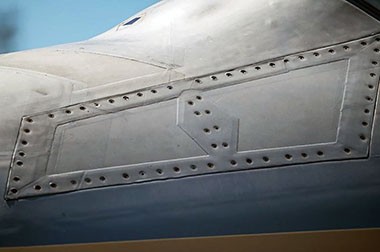2024 T81 Aluminum Plate
2024-T81 is a heat treatment condition of 2024 aluminum alloy. 2024 aluminum alloy is a high-strength alloy primarily used in aerospace, automotive, and military applications, known for its excellent strength and high-temperature resistance. T81 is the condition after specific solution heat treatment and strain hardening.
In the T81 condition, the 2024 aluminum alloy is first subjected to solution heat treatment to ensure the optimal solid solution state of the alloy, followed by approximately 1% strain hardening. The strain hardening process further enhances the material's strength, and finally, artificial aging is applied to improve its mechanical properties.
2024 T81 Aluminum standard designations and specifications
| Form | Standard Designations and Specifications |
| Plate and Sheet | 2024 T81, AMS QQ-A-250/4, AMS 4035, EN 3747, ASTM B209 |
| Alclad Sheet | 2024 T81, AMS QQ-A-250/5, ASTM B209 |
2024 T81 Aluminum Plate Performance Characteristics
Strength
2024-T81 aluminum has high strength, particularly in aerospace applications, where it is often used to manufacture structural components that need to withstand high loads. Compared to other aluminum alloys, 2024-T81 provides superior tensile strength and yield strength.
Workability
2024-T81 aluminum plate has good workability and can be processed using conventional methods such as milling and turning. However, due to its high strength, tool and process parameters need to be adjusted accordingly during machining.
Weldability
The weldability of 2024-T81 aluminum is moderate, as cracking can occur during welding. Therefore, spot welding is often the best option. Other welding methods (such as TIG welding, MIG welding) may require higher technical expertise and pre-treatment measures.
Formability
2024-T81 aluminum has poor formability. Due to its high strength and strain hardening, the material is prone to cracking and deformation during processes such as bending and stamping. Therefore, it is more suitable for load-bearing structural parts, rather than complex forming processes.
Corrosion Resistance
2024-T81 aluminum has relatively poor corrosion resistance, especially in humid or marine environments. Its corrosion resistance is lower than that of other alloys. As a result, coating protection (such as anodizing or painting) is typically required to enhance its corrosion resistance, or materials more suitable for corrosive environments may be used.
Heat Treatment
2024-T81 aluminum undergoes heat treatment to improve its strength, with solution heat treatment and artificial aging being key steps in enhancing its performance. After this heat treatment, the alloy has an excellent strength-to-weight ratio.
2024 T81 Aluminum Supplied Forms
| Product | Main Difference | Typical Applications |
| 2024 T81 Aluminum Sheet | Thin sheet form, used for flat or moderately formed parts. | Aerospace, automotive, and military structural components. |
| 2024 T81 ALCLAD Sheet | Same as the sheet but with a corrosion-resistant pure aluminum cladding. | Aircraft fuselages, wings, and parts exposed to harsh environments. |
| 2024 T81 Aluminum Plate | Thicker form, suitable for high-stress, large structural parts. | Heavy-duty aerospace and military applications, such as wing spars and frames. |
2024 T81 Aluminum Sheet
2024 T81 aluminum sheet is a high-strength, heat-treated alloy that is typically used in applications requiring a combination of excellent strength-to-weight ratio and good fatigue resistance. In the T81 state, the alloy undergoes solid solution heat treatment followed by 1% strain hardening and artificial aging to enhance its mechanical properties.
2024 T81 aluminum sheet is commonly used in aerospace, military, and high-performance transport applications. Typical uses include aircraft fuselages, wing structures, and other load-bearing components.
2024 T81 ALCLAD Sheet
2024 T81 ALCLAD sheet is a version of the 2024 aluminum sheet that has been coated with a thin layer of pure aluminum (cladding) to provide improved corrosion resistance. The cladding layer protects the alloy from environmental elements, particularly moisture and saline conditions, which are a concern for aerospace applications.
2024 T81 ALCLAD sheet is widely used in aerospace applications where both high strength and improved corrosion resistance are needed, such as in aircraft fuselages, wings, and other critical parts exposed to harsh environments.
2024 T81 Aluminum Plate
2024 T81 aluminum plate is similar to the T81 aluminum sheet, but it is typically thicker and used in applications where larger, more robust structural components are needed. It undergoes the same heat treatment process (solid solution heat treatment, strain hardening, and artificial aging), resulting in a high-strength material that is ideal for demanding structural applications.
2024 T81 aluminum plate is often used in aerospace and military applications where thickness and high strength are required, such as in aircraft skins, wing spars, fuselage frames, and other critical load-bearing components.
| Property | 2024 T81 Aluminum Sheet | 2024 T81 ALCLAD Sheet | 2024 T81 Aluminum Plate |
| Strength | High | High | High |
| Corrosion Resistance | Poor (requires coating or treatment) | Improved (due to pure aluminum cladding) | Poor (requires coating or treatment) |
| Weldability | Fair (spot welding preferred) | Fair (spot welding preferred) | Fair (spot welding preferred) |
| Workability (Machinability) | Good (with proper machining) | Good (cladding layer doesn't affect base) | Good (with proper machining) |
| Formability | Poor (high strength leads to cracking) | Poor (same as sheet, but with cladding) | Poor (high strength leads to cracking) |
| Applications | Aircraft structural parts, transportation | Aircraft fuselages, wings, and harsh environments | Heavy-duty aerospace and military components |
| Heat Treatment | Solid solution heat treated, strain-hardened, artificially aged | Same as sheet, with cladding added | Same as sheet, used in thicker applications |
2024 T81 Aluminum Applications
2024 T81 aluminum alloy, with its high strength, good fatigue performance, and excellent corrosion resistance, is an essential material in the aerospace industry. It is particularly suitable for applications that require high strength and corrosion resistance while also aiming to reduce weight, such as engine nacelle skins, hydraulic connectors, and tail beams. Its application in aircraft highlights the integration of lightweight design and high-performance materials, enhancing overall aircraft performance and safety.
1. Engine Nacelle Skin Components
The engine nacelle is one of the most critical components of an aircraft. It must withstand high temperatures from the engine while providing sufficient strength to protect the engine and fuselage from external damage. The application of 2024 T81 aluminum alloy in engine nacelle skins is primarily due to its outstanding strength and corrosion resistance, especially under high temperatures and harsh environments.
- Advantages: 2024 T81 aluminum alloy has extremely high strength, especially after being treated in the T81 condition, where its aging-strengthened properties significantly increase the material’s strength. Additionally, its fatigue resistance is also good, which is crucial for the engine nacelle, which is subjected to airflow pressure and temperature fluctuations.
- Application: When used in engine nacelle skins, 2024 T81 aluminum alloy can withstand the high temperatures and pressures around the engine, while also providing some formability for easy shaping and processing. Its corrosion resistance ensures the structural stability of the skin in prolonged exposure to high temperatures and humid environments.
2. Hydraulic Connectors
Hydraulic systems are vital in aircraft and spacecraft, particularly in control, braking, and landing gear systems. As key components in hydraulic systems, hydraulic connectors must possess excellent strength, corrosion resistance, and good machinability. 2024 T81 aluminum alloy is commonly used in the manufacture of hydraulic connectors due to its high strength and good corrosion resistance.
- Advantages: 2024 T81 aluminum alloy provides sufficient strength in hydraulic connectors to withstand high-pressure liquids while offering high corrosion resistance, making it suitable for the fluid environments in hydraulic systems. Its high strength allows it to handle extreme working pressures, while also reducing the weight of the connector and improving overall system efficiency.
- Application: In hydraulic connectors, 2024 T81 aluminum alloy is often used to manufacture components such as pipe fittings and valve housings. These parts need to withstand long-term hydraulic pressure, friction, and environmental changes, and 2024 T81 aluminum alloy’s performance meets these requirements.
3. Tail Beam
The rear structure of an aircraft requires sufficient strength to support the weight of the rear fuselage and withstand aerodynamic pressures. The tail beam is a critical load-bearing component at the tail of the aircraft, and it must support both longitudinal and lateral loads while providing some ductility to resist potential impacts. The application of 2024 T81 aluminum alloy in tail beams is based on its strength, corrosion resistance, and good structural stability.
- Advantages: As an essential structural component of the aircraft, the tail beam must have sufficient strength to support the rear cabin and tail weight and withstand aerodynamic load pressures. The high strength and fatigue resistance of 2024 T81 aluminum alloy make it highly suitable for this application. Additionally, the corrosion resistance of 2024 T81 in the T81 condition ensures protection against corrosion damage over the aircraft’s service life.
- Application: Tail beams are typically manufactured from aluminum alloy profiles or plates. The high strength and relatively low density of 2024 T81 aluminum alloy make it an ideal choice for aircraft structures. The manufacturing of tail beam components involves complex extrusion and forming processes, and 2024 T81 aluminum alloy’s good machinability enables it to meet these manufacturing requirements.
2024 T81 Aluminum Chemical Properties
| Chemical Properties | % Value |
| Silicon (Si) | 0,00 - 0,50 |
| Chromium (Cr) | 0,00 - 0,10 |
| Manganese (Mn) | 0,30 - 0,90 |
| Magnesium (Mg) | 1,20 - 1,80 |
| Copper (Cu) | 3,80 - 4,90 |
| Titanium (Ti) | 0,00 - 0,15 |
| Iron (Fe) | 0,00 - 0,50 |
| Zinc (Zn) | 0,00 - 0,25 |
| Aluminium (Al) | Balance |
2024 T81 Aluminum Physical Properties
| Physical Properties | Value |
| Density | 2.78 g/cm³ |
| Melting Point | 502 °C |
| Thermal Expansion | 22.9 µm/m.°C |
| Modulus of Elasticity | 72.4 GPa |
| Thermal Conductivity | 151 W/m.K |
| Electrical Resistivity | 38% IACS |
2024 T81 Aluminum Mechanical Properties
| Mechanical Properties | Value |
| Proof Strength | 370 - 450 MPa |
| Yield Strength | 425 - 485 MPa |
| Shear Strength | 295 MPa |
| Elongation A50 mm | 2% - 7% |
| Hardness | 128 HB |
| Mechanical Properties | |||
| Thickness (mm) | Proof Strength (Min.) | Yield Strength (Min.) | Elongation A50 mm % |
| over 0,25 up to & incl. 1,57 mm | 370 MPa | 425 MPa | ≥5% |
| over 1,60 up to & incl. 6,32 mm | 385 MPa | 450 MPa | ≥5% |
2024 T81 Aluminum More informations
| Physical Properties | Metric | English | Comments |
| Density | 2.78 g/cc | 0.1 lb/in³ | AA; Typical |
| 2024 T81 Aluminum Mechanical Properties | |||
| Hardness, Brinell | 128 | 128 | 500 kg load with 10 mm ball |
| Hardness, Knoop | 161 | 161 | Converted from Brinell Hardness Value |
| Hardness, Rockwell A | 48.9 | 48.9 | Converted from Brinell Hardness Value |
| Hardness, Rockwell B | 79 | 79 | Converted from Brinell Hardness Value |
| Hardness, Vickers | 146 | 146 | Converted from Brinell Hardness Value |
| Tensile Strength, Ultimate | 485 MPa | 70300 psi | |
| Tensile Strength, Yield | 450 MPa | 65300 psi | |
| Elongation at Break | 2 % | 2 % | Foil |
| Elongation at Break | 6 % | 6 % | In 5 cm; Sample 1.6 mm thick |
| Modulus of Elasticity | 72.4 GPa | 10500 ksi | Average of Tension and Compression. In Aluminum alloys, the compressive modulus is typically 2% greater than the tensile modulus |
| Poisson's Ratio | 0.33 | 0.33 | |
| Fatigue Strength | 125 MPa | 18100 psi | 500,000,000 Cycles |
| Shear Modulus | 28 GPa | 4060 ksi | |
| Shear Strength | 295 MPa | 42800 psi | |
| 2024 T81 Aluminum Electrical Properties | |||
| Electrical Resistivity | 4.49e-006 ohm-cm | 4.49e-006 ohm-cm | AA; Typical at 68°F |
| 2024 T81 Aluminum Thermal Properties | |||
| CTE, linear 68°F | 23.2 µm/m-°C | 12.9 µin/in-°F | AA; Typical; Average over 68-212°F range. |
| CTE, linear 250°C | 24.7 µm/m-°C | 13.7 µin/in-°F | Average over the range 20-300ºC |
| Specific Heat Capacity | 0.875 J/g-°C | 0.209 BTU/lb-°F | |
| Thermal Conductivity | 151 W/m-K | 1050 BTU-in/hr-ft²-°F | AA; Typical at 77°F |
| Melting Point | 502 - 638 °C | 935 - 1180 °F | AA; Typical range based on typical composition for wrought products 1/4 inch thickness or greater. Eutectic melting is not eliminated by homogenization. |
| Solidus | 502 °C | 935 °F | AA; Typical |
| Liquidus | 638 °C | 1180 °F | AA; Typical |
| 2024 T81 Aluminum Processing Properties | |||
| Annealing Temperature | 413 °C | 775 °F | |
| Solution Temperature | 256 °C | 493 °F | |








